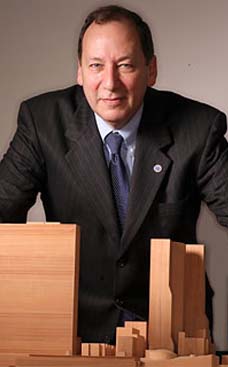
Swiller explained that he spent his childhood reading as a means of connecting to the world around him and that he was constantly searching for meaning, trying to understand where he belonged. Deafness for Swiller was a feeling of in-between--being not quite here or there. “I thought I would find the answers at Yale University, but there, I felt lost and isolated,” said Swiller. He became a student at Yale before the Americans with Disabilities Act mandated accessibility. He didn’t know any other deaf people or even that he had any rights as a deaf person. But in Zambia, deafness allowed Swiller to bond with the villagers; the survival skills he developed growing up deaf allowed him to adapt more easily than the hearing volunteers. His quick learning of the Bemba language he attributes to intense lip-reading, though he credits his ability to make fast friends to his copy of the swimsuit issue of Sports Illustrated.
Author and Peace Corps volunteer Josh Swiller visits Gallaudet
Author and Peace Corps volunteer Josh Swiller opens dialogue
Josh Swiller, a New York-based writer, teacher, and social worker, spent two years in Zambia as a Peace Corps volunteer among black mamba snakes, raging hippos, and murderous village elders. As an oral deaf person who had never felt a part of either the deaf or hearing world, Swiller found a place where hearing status was irrelevant--other needs were far too pressing.
Deaf since the age of 4, Swiller communicates mainly through speaking and lip-reading but learned sign language when he studied at Gallaudet in the early 1990s. When hearing aids stopped working for him, Swiller communicated mainly in sign language for two years before getting a cochlear implant. When Dr. Gina Oliva, a professor in the Department of Physical Education and Recreation, and graduate student Summer Crider met Swiller at the Annual Conference on Mainstreaming Students with Hearing Loss, which is sponsored by the Mainstream Center at Clarke School for the Deaf, they invited him to visit Gallaudet to share his Peace Corps experience and learn more about the University today. Swiller recently published a memoir of his experience, Unheard: A Memoir of Deafness and Africa, and has been traveling the country sharing his unique perspective.
Swiller’s November 27 visit to Gallaudet included a presentation of his adventures in the Peace Corps, a roundtable discussion on Gallaudet and the deaf community, and a film screening and discussion.
In his Peace Corps presentation, Swiller told a large group of students, faculty, and staff, that, in his experience, Africa was a place where deafness didn’t matter. He said he was attracted to the Peace Corps because he believed that he would find an intense experience--a place where deafness would have less significance--and he found it in a village in Zambia. “Africa was intense because the people there have so many real problems like poverty and death; deafness became a non-issue,” said Swiller.
This experience was a marked contrast to what he faced growing up. “My parents assumed I was slow before they found out I was deaf,” Swiller said. This was the beginning of a struggle with deafness that would last into adulthood.
Swiller explained that he spent his childhood reading as a means of connecting to the world around him and that he was constantly searching for meaning, trying to understand where he belonged. Deafness for Swiller was a feeling of in-between--being not quite here or there. “I thought I would find the answers at Yale University, but there, I felt lost and isolated,” said Swiller. He became a student at Yale before the Americans with Disabilities Act mandated accessibility. He didn’t know any other deaf people or even that he had any rights as a deaf person.
But in Zambia, deafness allowed Swiller to bond with the villagers; the survival skills he developed growing up deaf allowed him to adapt more easily than the hearing volunteers. His quick learning of the Bemba language he attributes to intense lip-reading, though he credits his ability to make fast friends to his copy of the swimsuit issue of Sports Illustrated.
Swiller also had two important pieces of advice for anyone in the audience with a yen to travel to Africa’s hinterlands: three pairs of underwear will last a person for two years, and never get between a hippo and the water.
The roundtable discussion, Swiller’s next activity, was planned by Crider and Oliva in consultation with several faculty members. It began by discussion of an idea posed by Michael Chorost, author of Rebuilt: My Journey Back to the Hearing World. During his recent visit to campus, Chorost said that Gallaudet has the potential for “teaching the nation how to form and sustain healthy communities.” Swiller has made strong statements about changes he feels the University should make as a community. The roundtable enabled him to engage in an intellectual and respectful discussion with Gallaudet faculty, staff, and students about various perspectives on the kind of change needed.
That evening, Honors students explored another side of Swiller. They were invited to bring a friend to the Honors Lounge to munch on pizza and watch the 1993 film Little Buddha. The movie lent itself easily to discussion with its theological themes and thought-provoking quotes like, "To learn is to change." Dr. Jane Hurst, professor and chair of the Department of Philosophy and Religion, led a discussion about some of the themes arising in the movie, notably the differences between Christianity and Buddhism and the central concepts of Buddhism (the Buddha, the Dharma, and the Sangha). Swiller shared his journey as someone from a Jewish background who eventually spent four years as a Zen monk.
In answer to students’ questions, Swiller and Hurst were able to add explanations of Buddhism in practice. One student asked, "What is the role of emotion in Buddhism? In Christianity you have Jesus expressing anger and throwing tables, but I don't associate anger as an emotion expressed in Buddhism."
Swiller explained the idea of recognizing emotions without holding onto to them, acknowledging and accepting them but also letting them pass on. A telling example of detachment from ego and emotion was Swiller’s story of his Buddhist teacher's reaction upon arriving home and finding his house burning down. After a moment of watching the disaster, the teacher turned to the people with him and asked, "Does anyone have any marshmallows?"
Dr. Hurst likened the teacher’s reaction to the one she saw at a protest attended by Buddhist monks. A heavy rain started as they marched, which would have dampened most spirits. The monks, however, chose to laugh as they walked on.
From the challenges Swiller experienced as he struggled to find a niche in the deaf and hearing worlds and developed his religious beliefs to the trials of life as a college student, the themes of Swiller’s visit were readily applicable in everyone’s lives.
Dr. Hurst noted that while Swiller’s cultural and religious choices may have been different from the students’, a productive dialogue emerged. “They had a respectful discussion and asked perceptive questions about what is a foreign religion to many of them,” she said.
This will not be the last time Swiller will serve as a catalyst for discussion. His memoir is one of the Honors Program’s 2008 summer reading selections and he has been invited to present to the campus and meet with Honors students next fall. Those involved in the visit felt that Swiller offers an important experience and perspective on deaf life, and are eager to invite continuing dialogue.
More on Swiller’s book and his blog called Cochbla are available at www.joshswiller.com.













